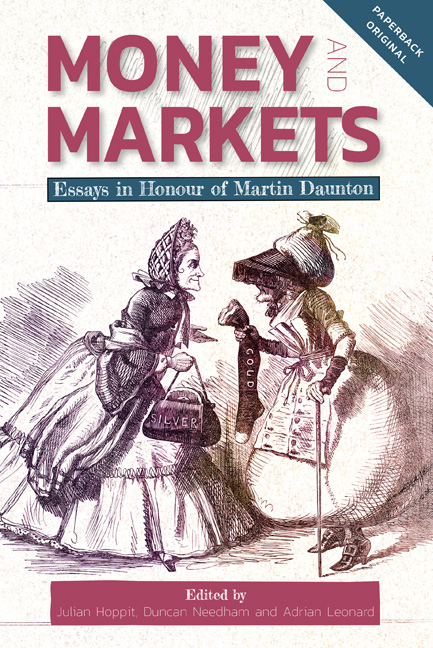Book contents
- Frontmatter
- Contents
- List of Figures
- List of Tables
- List of Contributors
- List of Abbreviations
- Introduction
- 1 Taxing London and the British Fiscal State, 1660–1815
- 2 Rents, Squalor, and the Land Question: Progress and Poverty
- 3 Marine Insurers, the City of London, and Financing the Napoleonic Wars
- 4 The Political Economy of Sir Robert Peel
- 5 Champagne Capitalism: France’s Adaptation to Britain’s Global Hegemony, 1830–80
- 6 The 1848 Revolution in Prussia: a Financial Interpretation
- 7 Imperial Germany, Great Britain and the Political Economy of the Gold Standard, 1867–1914
- 8 Knowledge, Contestation and Authority in the Eurodollar Market, 1959–64
- 9 Continuity and Change in British Conservative Taxation Policy, c. 1964–88
- 10 Britain Since the 1970s: a Transition to Neo-Liberalism?
- 11 Maplin: the Treasury and London’s Third Airport in the 1970s
- 12 Workfare and the Reinvention of the Social in America and Britain, c. 1965 to 1985
- 13 Charity and International Humanitarianism in Post-War Britain
- 14 Discounting Time
- 15 The Material Politics of Energy Disruption: Managing Shortages Amidst Rising Expectations, Britain 1930s–60s
- The Published Writings of Martin J. Daunton
- Index
- People, Markets, Goods: Economies and Societies in History ISSN: 2051-7467
13 - Charity and International Humanitarianism in Post-War Britain
Published online by Cambridge University Press: 13 April 2021
- Frontmatter
- Contents
- List of Figures
- List of Tables
- List of Contributors
- List of Abbreviations
- Introduction
- 1 Taxing London and the British Fiscal State, 1660–1815
- 2 Rents, Squalor, and the Land Question: Progress and Poverty
- 3 Marine Insurers, the City of London, and Financing the Napoleonic Wars
- 4 The Political Economy of Sir Robert Peel
- 5 Champagne Capitalism: France’s Adaptation to Britain’s Global Hegemony, 1830–80
- 6 The 1848 Revolution in Prussia: a Financial Interpretation
- 7 Imperial Germany, Great Britain and the Political Economy of the Gold Standard, 1867–1914
- 8 Knowledge, Contestation and Authority in the Eurodollar Market, 1959–64
- 9 Continuity and Change in British Conservative Taxation Policy, c. 1964–88
- 10 Britain Since the 1970s: a Transition to Neo-Liberalism?
- 11 Maplin: the Treasury and London’s Third Airport in the 1970s
- 12 Workfare and the Reinvention of the Social in America and Britain, c. 1965 to 1985
- 13 Charity and International Humanitarianism in Post-War Britain
- 14 Discounting Time
- 15 The Material Politics of Energy Disruption: Managing Shortages Amidst Rising Expectations, Britain 1930s–60s
- The Published Writings of Martin J. Daunton
- Index
- People, Markets, Goods: Economies and Societies in History ISSN: 2051-7467
Summary
In Charity, self-interest and welfare in the English past, Martin Daunton assembled a collection of authors committed to demonstrating the everchanging nature of welfare provision over the centuries. Martin clearly set out the differing forms of welfare provision – commercial, public, charitable, and household – with the balance between the four never being fixed. Indeed, in Jo Innes’ contribution, the precise nature of the mix between these different forms of welfare was never a source of agreement. While commentators might concur that all four served a purpose, the respective weight given to each one has always been in contention. In this chapter I focus on the relative weight given to charitable relief, and probe the nature of the mixed economy of welfare when that model of relief was taken abroad – by British charities, voluntary associations, and non-governmental organisations focused on humanitarian relief and long-term aid and development. In the latter half of the twentieth century they maintained a strong presence in the former territories of the British empire, though tragedy respects no borders, and organisations such as Oxfam, Christian Aid, and Save the Children came to operate in virtually every country the world over.
In Martin's introduction, he was keen to move away from older debates about charity and philanthropy that focused on their roles as agents of social control. Instead, the volume recognised the positive role charity could play in, for instance, the formation of new middle-class identities and in the opportunities afforded to women in the public sphere otherwise denied to them. In writing of the late nineteenth century Martin observed that, like today, charity constituted an incredibly diverse sector. It was, however, also the ‘golden age’ of philanthropy, as Frank Prochaska has argued. Prochaska has estimated that the middle classes spent a larger amount of their income on charity than on any item in their budget except food. Donations did not just come from the affluent. New research is showing the extent to which the British public as a whole responded to poverty and suffering at home and abroad. But precisely because charity was just one pillar of the mixed economy of welfare, the history of charity is intricately bound up with the history of capitalism, a point Martin has returned to in his other works on the history of political economy.
- Type
- Chapter
- Information
- Money and MarketsEssays in Honour of Martin Daunton, pp. 235 - 250Publisher: Boydell & BrewerPrint publication year: 2019

